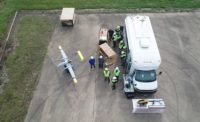The Federal Aviation Administration on Nov. 3 convened a 26-person task force to develop ideas for a system to register unmanned aerial vehicles, or drones. Once the drone operators are registered, the FAA will be able to identify those pilots who violate its applicable regulations.
The task force has only until Nov. 20 to deliver. In remarks opening the task force’s first three-day session, FAA Administrator Michael Huerta challenged the group to “think big and think outside the box. Take the interests of all stakeholders, of everyone who will be affected by registration, into consideration.”
The task-force members were recruited by invitation, according to Les Dorr, FAA spokesman. The task force comprises officials from associations that represent the aerospace industry, civil aviation, drone and aircraft manufacturers, airline pilots, airport executives, surveyors, model-airplane enthusiasts and retailers, such as BestBuy, Walmart and Amazon—but none from construction.
Dan Burton, CEO of DroneBase, a Santa Monica, Calif., operator who flies drone missions for construction-industry clients, notes that while he sees construction as a “key vertical” in the industry and that there is no construction-specific player on this task force, he says his company is quite close to several members of the group and will “work to ensure that the voice of the construction industry is being heard.”
Closely following the development of drone regulations, Greg Sherwin, director of preconstruction and estimation at Midwest Constructors LLC, says he is not troubled by the lack of specific representation from construction. “I don’t see the need for anything different than other industries. We are all operating in the same airspace,” he says.
A bigger issue is whether people are aware of the regulations that already exist, he notes, adding, “They can regulate all they want, but people need to know that there are regulations and that there are penalties.”
Meanwhile, the FAA is developing a smartphone app operators can use to refer to the regulations and identify exclusion zones. B4UFLY is in testing, although commercial variants already exist.



